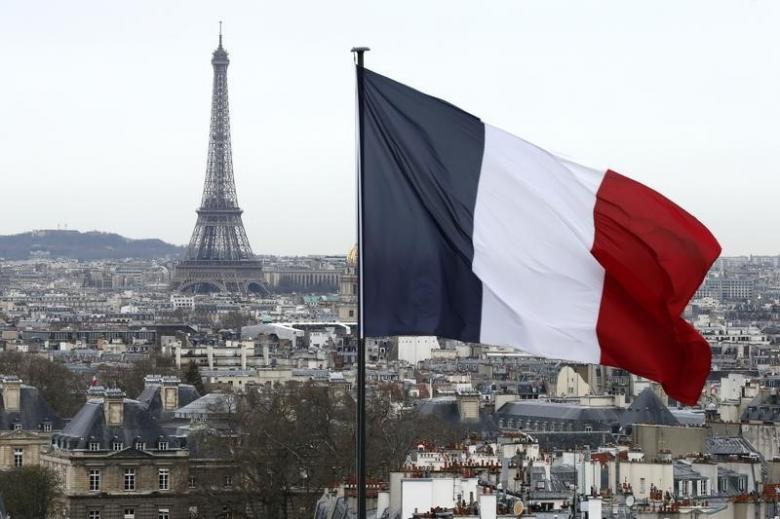With such high turnout in Sunday’s first-round presidential vote, one thing that would seem to be working in France is democracy. But a recent survey revealed that 70 percent of French voters believe that democracy does not work well in France. Only 11 percent trust political parties and 24 percent trust the media (the army and police are the exception, with close to 80 percent support). In this context, the big question facing the next French president is whether he — as it almost certainly will be Emmanuel Macron — can keep the social peace in a country that is seething with divisions and has a long history of airing them on the streets.
The signs of pent-up social discontent are everywhere. Some 63 percent of young French claim to be ready for a “large-scale revolt.” The head of France’s general directorate for internal security warned, in a parliamentary commission deposition last year, that the country was “on the verge of civil war.” The numbers of days lost to strike action is the largest among comparable countries; 40,000 cars are set ablaze annually in France’s often ghettoized suburbs. The portion of voters who rejected mainstream political offerings — over 40 percent — was higher than at any time in France’s modern political history, revealing a much deeper level of discontent than previously acknowledged.
The French may be more prone than almost any other nation to take their grievances to the street; it’s a country better suited to revolution than reform, as Alexis de Tocqueville observed. But while the source of discontent has been increasing, the government’s room for maneuver has been shrinking.
While Germany and Spain enacted some reforms of their labor laws and education systems to improve competitiveness, France has largely kept its existing system, best known by the 35-hour workweek. This has resulted in a marked reduction of French industrial production, while Germany’s has been expanding (a drop of 15 percent in France since 2000, versus an increase of more than 20 percent in Germany) and an unemployment level that, at 10 percent, is far higher than Germany’s, at 3.8 percent.
Meanwhile, continuous flows of poor, uneducated migrants from Africa, attracted by high level of benefits and free public services, have created a combustible underclass in France’s suburbs. While they carry French citizenship, they have not been as well- integrated as previous waves of immigrants. If foreigners are 2.5 times more likely to be unemployed, the second generation of non-EU immigrants is three times as likely. Over 40 percent of young foreigners have no job; many live in restless ghettos where drugs and crime thrive.
Successive French governments have attempted to buy social peace through ever increasing social spending. The level of state expenditures has now reached 57 percent of gross domestic product; social spending is the highest among major developed nations at 31 percent of GDP. The spending spree has been financed by debt, now around 100 percent of GDP, and by heavily taxing labor. The French one-earner family is now the most heavily taxed among developed countries.
The tax burden and competitiveness issues have resulted in what is probably the largest emigration of young entrepreneurs and successful French citizens since the Huguenot exodus under Louis XIV. The French are generally not inclined to leave home; but according to the French business magazine Capital, a fifth of the country’s wealthiest individuals have moved to Belgium, and London has enough French expatriates to count it as a small French city, the size of Strasbourg or maybe Nice.
With the state no longer able to buy time or pay off those who are discontent with more generous services, the French social contract — the implied deal that a generous state will be funded by high levels of taxation — has broken down. Immigrants feel unfairly treated, workers unfairly taxed, the lower class unfairly abandoned, and the retirees frightened. The result of fear and insecurity was a massive rejection of the “establishment” in Sunday’s vote, to the point that all leading presidential candidates have positioned themselves as “anti-system” in a campaign that was dominated by allegations of corruption.
On May 7, Emmanuel Macron is almost certainly going to be elected president. In June, parliamentary elections will be held, in which candidates with more than 12.5 percent of the registered vote reach the second round. This means, in the new fragmented political landscape, that he is unlikely to have a presidential majority. Yet a coalition or minority government would be unable to offer the clear parliamentary majority to support desperately needed reforms, easily slipping to compromise reminiscent of the unstable Fourth Republic.
The government will then, as it has in the recent past, use a special prerogative to bypass the parliament when enacting laws, but that is a dangerous exercise in an increasingly restless society. France generally takes in its stride the kind of social unrest — car burnings and weeks-long protests and strikes — that would unsettle other nations. The new president traditionally enjoys a honeymoon period. He’ll have to use it well before the gloves come off again.
(Bloomberg)
